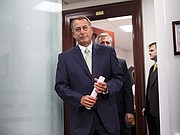GOP: Dodge default, defund Obamacare
WASHINGTON - House Republicans vowed Wednesday to pass legislation that would prevent a partial government shutdown and avoid a historic national default while simultaneously canceling out President Barack Obama's health care overhaul, inaugurating a new round of political brinkmanship as critical deadlines approach.
Obama swiftly condemned the effort as attempted political extortion, and the Republican-friendly Chamber of Commerce pointedly called on lawmakers to pass urgent spending and borrowing legislation - unencumbered by debate over "Obamacare."
The two-step strategy announced by House Speaker John Boehner marked a concession to his confrontational rank and file. At the same time, it represented a challenge to conservatives inside the Senate and out who have spent the summer seeking the votes needed to pull the president's cherished health care law out by its roots. They now will be called on to deliver.
"The fight over here has been won. The House has voted 40 times to defund, change Obamacare, to repeal it. It's time for the Senate to have this fight," said Boehner, an Ohio Republican.
As outlined by several officials, Boehner and the leadership intend to set a House vote for Friday on legislation to fund the government through Dec. 15 at existing levels while permanently defunding the health care law. The same bill will include a requirement for Treasury to give priority to Social Security and disability payments in the event the government reaches its borrowing limit and cannot pay all of its obligations.
A second measure, to be brought to the floor as early as next week, would allow Treasury to borrow freely for one year.
That same bill is also expected to be loaded with other requirements, including the construction of the Keystone XL Pipeline from Canada to the United States, a project that environmentalists oppose and that the Obama administration has so far refused to approve. Other elements will reflect different Republican budget priorities, including as-yet-undisclosed savings from health care and government benefit programs and steps to speed work on an overhaul of the tax code.
Prospects for passage of the two bills are high in the House, where Republicans have a majority and leaders pronounced the rank and file united behind the strategy.
But both measures are certain to be viewed as non-starters by majority Democrats in the Senate.
Some Republicans appeared to concede during the day that the legislation that eventually reaches the White House will leave the health care law in effect.
"I don't think that any reasonable person thinks there's anything to be gained by a government shutdown," said Sen. John Cornyn, R-Texas. "Rather than a shutdown of government, what we need is a Republican victory in 2014 so we can be in control. I'm not sure those are mutually compatible."
But a fellow Texas Republican, Sen. Ted Cruz said it was important to hold fast. He said Democrats appear at present to have the votes to restore funds for the health care law, adding, "At that point, House Republicans must stand firm, hold their ground and continue to listen to the American people."
Given the differences, it is unclear how long it will take Congress and the White House to clear the measures, and how close the government will come to a partial shutdown or a market-rattling default over the next three weeks.
Separately, Federal Reserve Chairman Ben Bernanke said it was time to settle the fight over raising the ceiling on government borrowing.
"This is one of the risks we are looking at," Bernanke said at a news conference, expressing concern that a lingering battle between Congress and the White House over the debt limit - and default - could slow the national economy.



